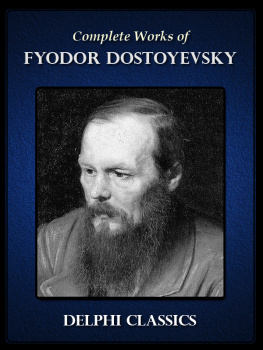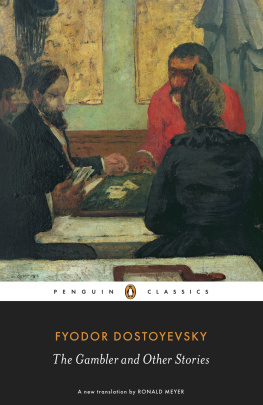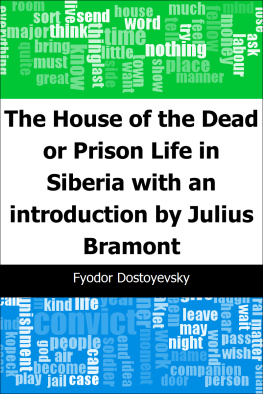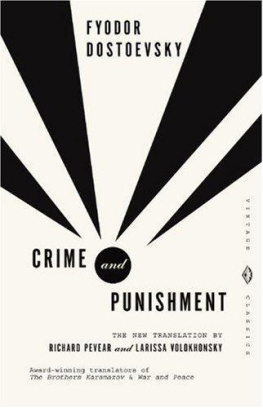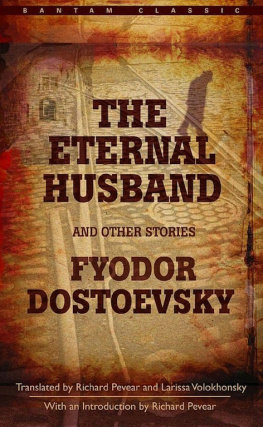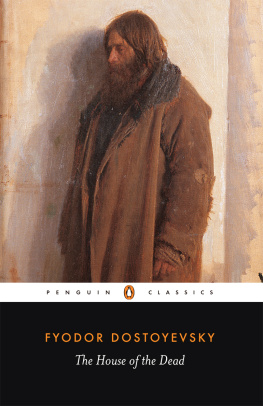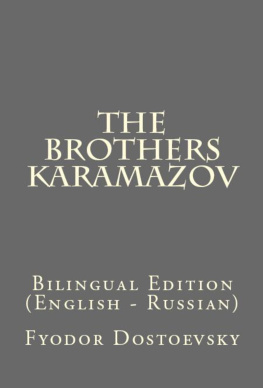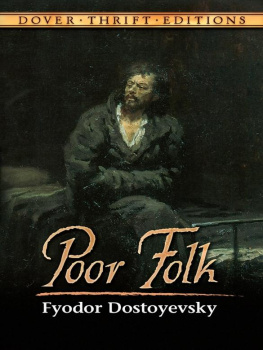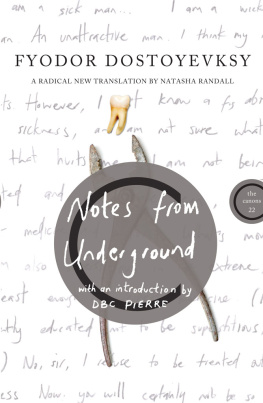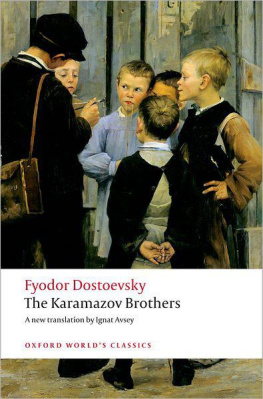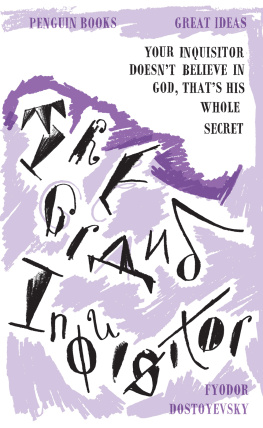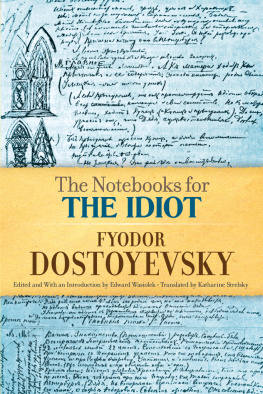Fyodor Dostoyevsky - The Brothers Karamazov (Bantam Classic)
Here you can read online Fyodor Dostoyevsky - The Brothers Karamazov (Bantam Classic) full text of the book (entire story) in english for free. Download pdf and epub, get meaning, cover and reviews about this ebook. year: 2003, publisher: Bantam Dell, genre: Art. Description of the work, (preface) as well as reviews are available. Best literature library LitArk.com created for fans of good reading and offers a wide selection of genres:
Romance novel
Science fiction
Adventure
Detective
Science
History
Home and family
Prose
Art
Politics
Computer
Non-fiction
Religion
Business
Children
Humor
Choose a favorite category and find really read worthwhile books. Enjoy immersion in the world of imagination, feel the emotions of the characters or learn something new for yourself, make an fascinating discovery.

- Book:The Brothers Karamazov (Bantam Classic)
- Author:
- Publisher:Bantam Dell
- Genre:
- Year:2003
- Rating:5 / 5
- Favourites:Add to favourites
- Your mark:
- 100
- 1
- 2
- 3
- 4
- 5
The Brothers Karamazov (Bantam Classic): summary, description and annotation
We offer to read an annotation, description, summary or preface (depends on what the author of the book "The Brothers Karamazov (Bantam Classic)" wrote himself). If you haven't found the necessary information about the book — write in the comments, we will try to find it.
The Brothers Karamazov (Bantam Classic) — read online for free the complete book (whole text) full work
Below is the text of the book, divided by pages. System saving the place of the last page read, allows you to conveniently read the book "The Brothers Karamazov (Bantam Classic)" online for free, without having to search again every time where you left off. Put a bookmark, and you can go to the page where you finished reading at any time.
Font size:
Interval:
Bookmark:
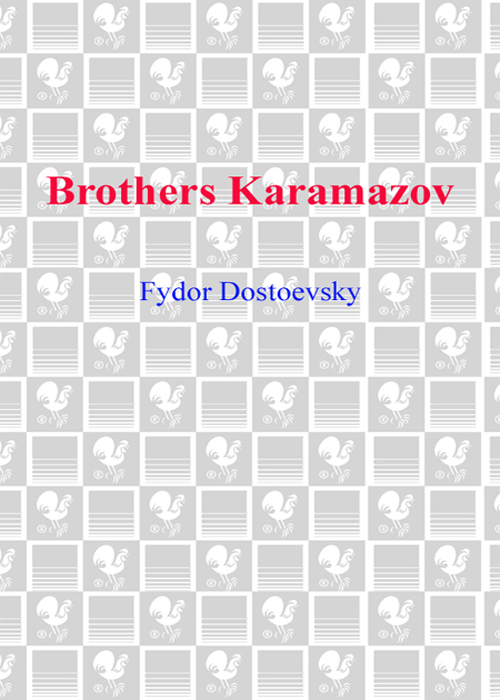
THE
BROTHERS
KARAMAZOV
FYODOR DOSTOEVSKY
Introductory Essay by Konstantin Mochulsky
Translated by Andrew R. MacAndrew
B A N T A M C L A S S I C
CONTENTS
A NOTE FROM THE TRANSLATOR
The best way of handling a translation is about as slippery a business as the best way of organizing a society, the best way of living a life, or, for that matter, the best way of writing. In dealing with a piece of literature a translator must hear its tone, judge its language, appreciate its style, and understand its subtleties of meaning, and then as if such passive appreciation were not hard enough, he must re-create all these features as closely as possible in a tongue foreign to the original.
In trying to convey the essence of a literary work in another language, he is in the position of a conductor of an orchestra of outlandish instruments asked to perform a classical symphony. He must first adapt the piece to the unfamiliar instruments and then guide his barbarous musicians through it. If he is tone-deaf in the language into which he translates, the effect may be like playing the Moonlight Sonata on a tin can.
Andrew R. MacAndrew
Verily, verily I say unto you, except a corn of wheat fall into the ground and die, it abideth alone: but if it die, it bringeth forth much fruit.
John xii,24
AUTHORS PREFACE
I N STARTING out on the life of my hero, Alexei Fyodorovich Karamazov, I feel somewhat at a loss. By this I mean that, although I refer to Alexei (Alyosha) as my hero, I am well aware that he is by no means a great man, and this leads me to anticipate such obvious questions as: What is so remarkable about your Alexei Karamazov that you should choose him as your hero? What exactly did he accomplish? Who has heard of him and what is he famous for? And why should I, the reader, spend time learning the facts of his life?
The last question is the fateful one because all I can answer is: You may find that out for yourself from the novel. But what if they read the novel and are still unconvinced that my Alexei is a remarkable man? I say this because I sadly anticipate it. To me, he is remarkable, but I very much doubt I will succeed in proving it to the reader. The trouble is that, although I suppose he may be described as a man of good works, he is still indeterminate, not fully recognizable as such. But then, would it not be rather strange to expect to find clear-cut characters in times like ours? One thing, though, is beyond doubt: he is a strange person, we might even say an eccentric. And peculiarity and eccentricity are more likely to create prejudice against a man than make people listen to him, especially nowadays when everyone tries to lump all the special cases together and to read some general meaning into the general meaninglessness. Isnt that so?
Now, if you dont agree with this, if you believe that it is not true, or at least not necessarily true, it will give me hope that my hero may be of some interest to you. For an eccentric is not necessarily an exception or an isolated phenomenon; indeed, it often happens that it is he who embodies the very essence of his time while his contemporaries somehow seem to have been cut loose from it by gusts of an alien wind.
Had it not been for one more difficulty, I would not have ventured into these boring and unclear explanations. I would have started the novel directly without any introduction, reasoning that a reader will finish the book anyway, if he is enjoying it. The additional difficulty is that, although I have only one life story to tell, there are really two novels here. The main novel is the second one, which describes the life of my hero in our time, at this very moment. As to the first novel, it takes place thirteen years ago and is perhaps not even really a novel but just the description of an important phase of the early youth of my hero. However, I cannot dispense with this first novel because much of the second one would be incomprehensible without it. And this complicates my original difficulty even further: if I, the biographer, feel that even one novel may be too much for a modest and obscure hero like mine, how can I come forward with two novels about him? How can I justify such presumptuousness?
Being unable to puzzle out these questions, I have decided to leave them unanswered. No doubt, a perspicacious reader will have guessed from the outset that this was what I was driving at and will be all the more irritated with me for spouting useless phrases and wasting his precious time. Well, Ill answer that precisely: I have been spouting useless phrases and wasting precious time, first of all, out of politeness and, secondly, out of slyness, to be able to say later: Well, I more or less warned you, didnt I? Besides, I am really quite glad that my novel split into two stories, while the essential unity of the whole was preserved. Once he has acquainted himself with the first story, the reader will be able to decide for himself whether it is worth his while to start the second. Of course, no one is bound in any way, and the book can be put aside after a couple of pages of the first story, too, and never picked up again. However, there are always some scrupulous readers who are determined to read to the end, no matter what, so that they can pass a fair and impartial judgment. Such, for instance, are all the Russian literary critics. And so I will feel less guilty toward these people if, scrupulous and thorough as they are, I give them a legitimate excuse for putting my story down in the middle of the very first episode.
So this is all my introduction. I fully agree that it is quite unnecessary, but since it is already written, I shall let it stand.
And now lets get down to business.
DOSTOEVSKY AND
THE BROTHERS KARAMAZOV
Konstantin Mochulsky
I N 1839 the eighteen-year-old youth Dostoevsky wrote to his brother: Man is a mystery: if you spend your entire life trying to puzzle it out, then do not say that you have wasted your time. I occupy myself with this mystery, because I want to be a man.
The great psychologist had a presentiment of his vocation: all his creative work is devoted to the mystery of man. In Dostoevskys novels there are no landscapes and pictures of nature. He portrays only man and mans world; his heroes are people from contemporary urban civilization, fallen out of the natural world-order and torn away from living life. The writer prided himself on his realism; he was describing not the abstract universal man, contrived by J. J. Rousseau, but the real European of the 19th century with all the endless contradictions of his sick consciousness. The Russian novelist first discovered the real face of the hero of our troubled timethe man from underground: this new Hamlet is struck by the infirmity of doubt, poisoned by reflection, doomed to a lack of will and inertia. He is tragically alone and divided in two; he has the consciousness of an harassed mouse.
Dostoevskys psychological art is famous throughout the world. Long before Freud and before the school of psychoanalysts he plunged into the depths of the subconscious and investigated the inner life of children and adolescents; he studied the psychics of the insane, maniacs, fanatics, criminals, suicides. Special commentaries exist on Dostoevsky, the psychopathologist and criminalist. But his analysis was not limited to individual psychology; he penetrated the collective psychology of the family, of society, of the people. His greatest insights concern the soul of the people, the metapsychic unity of mankind.
Next pageFont size:
Interval:
Bookmark:
Similar books «The Brothers Karamazov (Bantam Classic)»
Look at similar books to The Brothers Karamazov (Bantam Classic). We have selected literature similar in name and meaning in the hope of providing readers with more options to find new, interesting, not yet read works.
Discussion, reviews of the book The Brothers Karamazov (Bantam Classic) and just readers' own opinions. Leave your comments, write what you think about the work, its meaning or the main characters. Specify what exactly you liked and what you didn't like, and why you think so.

